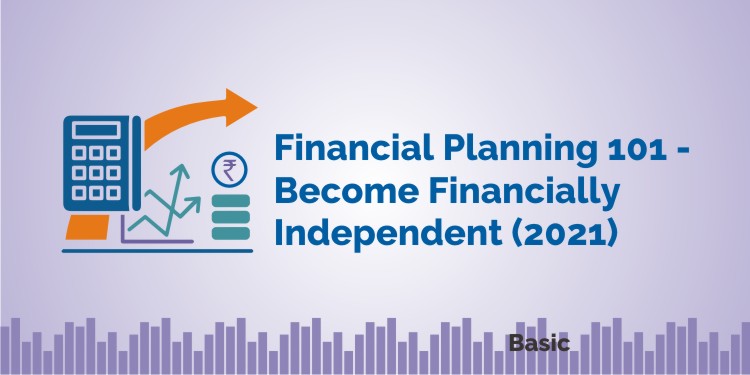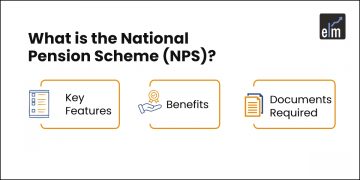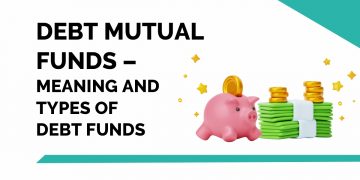Financial planning is the method that provides you with a framework to achieve your life goals in a planned and systematic way through avoiding shocks as well as surprises.
Have you ever wondered – “Do I really need a financial plan?”
According to some people financial planning is saving regularly in bank deposits or Systematic Investment Plans (SIPs) in mutual funds.
But allocating your savings in this unsystematic manner does not help you in achieving your life goals.
For becoming rich and to achieve all your life goals like buying a house or a car, dream vacation, marriage, child’s education you have to make money work for you.
Besides business income or salary might not be sufficient enough unless you invest in the financial vehicles based on your life goals.
This is where financial planning comes to your rescue.
A financial plan enables you to construct a road map to achieve all the financial goals. It also helps you build your contingency fund for any unforeseen needs that may arise.
The first question that might come to you is how to do my financial planning.
Here is a complete guide on how to become financial independent.
- How to do Financial Planning?
- Best books on financial planning
- Handpicked Courses for financial planning:
- Handpicked Webinars for financial planning:
How to do Financial Planning?
Below are the ways on how to start your financial planning:
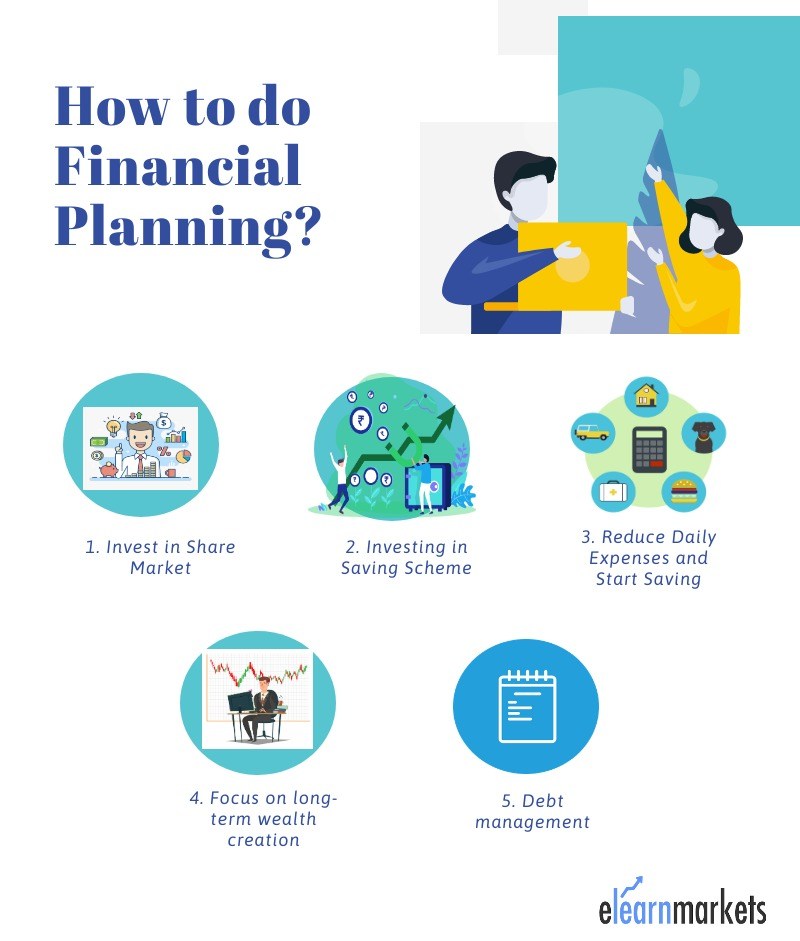
1. Invest in Share Market:
The best way of making you money work is by investing in the stock market for long term and taking the advantage of compounding invest.
You can directly invest in the stock market through a demat or trading account or indirectly invest in the stock market through investing in the mutual funds.
Below are the ways of investing in the stock market directly or indirectly.
a. Equity:
If you have knowledge of how the stock market functions and how to trade in the stock market then you can directly invest in the stock market.
For making long term investment decisions you can do fundamental analysis of the companies and decide in which companies you want to invest in.
After deciding in which companies to invest in you should contact a broker and open demat and trading account.
After opening these two accounts you can place your order and buy the shares of the company.
b. Mutual Funds:
Mutual funds are one of the financial planning tools that help to diversify your risk by investing in different stocks.
If you do not have knowledge of the stock market or time to conduct analysis you can take help of the asset management companies.
They will advise you help you in choosing which mutual funds you should invest in according to your financial plan and goals.
In return you will have to pay some commission fees for their services.
Investing in the mutual funds is one of the ways for diversifying your risk in different sectors and securities.
c. Tax Saving Funds :
Tax Saving Mutual Fund is considered as one of the best tax saving option for financial planning.
These funds are designed for giving you the benefit of both saving taxes and also forgetting higher returns on investment.
2. Investing in Saving Scheme:
Another way for making your money work is by investing in Saving Scheme to achieve your goals for financial planning.
Below are the different Saving Scheme vehicles for achieving your financial goals.
a. ULIP (Unit linked Insurance Plans):
ULIPs are a mixture of insurance and investment in which a portion of the invested amount in ULIPs is used for providing insurance and the rest is invested in the stock markets.
One can make investments of up to Rs 1.5 lakh in ULIPs which are eligible for tax breaks under Section 80C.
b. PPF (Public Provident Fund):
Public Provident Funds are long term investments that are backed by Government of India
The deposits made in a PPF are eligible for tax deductions under the Section 80C.
The PPF accounts can be opened by Resident Indian individuals, salaried and non-salaried individuals.
PPF account have lock-in period of 15 years, but can be extended by 5 years and also partial withdrawals are allowed after 7 years.
c. Fixed Deposit:
Tax-saving FDs are like regular fixed deposits with a lock-in period of 5 years and tax break under Section 80C on investments of up to Rs 1.5 lakh.
FD can be opened by Resident Indian individuals and they have lock-in period of 5 years.
d. ELSS (Equity-Linked Savings Scheme):
ELSS is a tax-saving investment under Section 80C of the Income Tax Act.
By investing in ELSS, investors can claim a tax rebate of up to Rs 1,50,000 a year and save up to Rs 46,800 a year in taxes.
An ELSS is the only kind of mutual fund that is eligible for tax benefits and the portfolio of these mainly consist equity-linked instruments such as shares.
e. NPS (National Pension Scheme):
The NPS is a pension scheme that was started by the Indian Government to allow the unorganized sector and also the working professionals to have a pension after their retirement.
In NPS Investments of up to Rs 1.5 lakh can be used for availing tax deductions under Section 80C
This can be opened by every Indian citizen between the age of 18 and 60 and partial withdrawals are allowed after 15 years but under specific conditions.
f. Senior Citizen Saving Scheme:
The Senior Citizens Savings Scheme (SCSS) is mainly for the senior citizens of India and it is an apt choice of investment for those over 60 years of age.
The scheme offers a regular income with safety and tax saving benefits.
Senior citizens resident in India can invest a lump sum in the scheme, either individually or jointly, and can get access to regular income with tax benefits.
g. National Saving Certificate:
National Savings Certificate is a fixed-income investment scheme that is backed by the government of India.
This savings bond is suitable for all the small and medium-income investors for saving tax while earning returns.
This is a secure as well as low-risk product.
h. Post Office Monthly Income Scheme :
Post Office Monthly Income Scheme, along with other postal schemes such as Post Office Savings Account, Post Office Recurring Deposit, Post Office Time Deposit, is one of the highest-earning schemes giving an interest rate of 7.6%.
The interest in this scheme is disbursed monthly and like other post office schemes is recognized and backed by The Ministry of Finance.
3. Reduce Daily Expenses and Start Saving:
Not only investing in the above mention investment products will help you to achieve your financial goals.
For a better financial planning, you also need to reduce daily expenses and start saving.
Below are the ways of reduce daily expenses and creating wealth aside from your salary:
a. Create a second income source:
Apart from your main salary or business income you should try to create a second income source which can help you in achieving your financial goals and assist in your financial planning.
To create a second income source you can take a part time job apart from your full time job.
b. Start a side business:
To create additional income you can also side start a side business.
For example if you like cooking you can start a restaurant or you could start a weekend catering business or a food truck.
A business in which you provide small services on your own schedule can grow as much or as little as your time allows.
This will help you in creating a second income source and help you in achieving you financial goals quickly and you retire early.
c. Rent a free space:
You can also invest in a property and rent that space for creating additional income apart from your salary.
You can rent that free space as a dance studio or for other purposes. This way you can earn additional income without spending time one the same
d. Start Freelancing:
You can also start freelancing to create a second income source.
It all starts with knowing your financial goals to start your freelance business.
You just wouldn’t get in your car and start driving if you don’t know your destination; similarly you shouldn’t start a freelance business without determining your destination either.
Without a destination, it is hard to know what direction to move.
Thus financial goals provide that destination for starting your freelancing business and assist in your financial planning.
4. Focus on long-term wealth creation:
You should try to focus on long-term wealth creation for achieving your financial goals. Below are the ways for creating long term wealth creation.
a. Create a financial goal:
Financial goals are saving and investment targets that you hope for achieving over a set period of time that assists in your financial planning.
Usually the stage of life you are in helps in determining what type of goals you wish to achieve.
For example, if you are in college, your short-term goal may be saving for a new pair of shoes or like saving for a car or a new gadget.
On the other hand, a person with a growing family will have a long-term goal like renting a home or owning one.
Other popular goals are saving for a child’s college education or saving for your own retirement.
So before you start financial planning, you need to set a financial goal.
b. Plan a budget:
Creating a budget is a great way for having knowledge about your financial limits.
But creating budget is only useful if you can clearly define the amount of income and fixed expenses in your household.
You can make a list of salary and expenses and according make decision whether you have to save more to achieve your financial goals.
One of the ways of planning your budget is by 50/30/20 rule of thumb.
The 50/30/20 rule of thumb is a way of allocating your budget according to three categories: needs, wants, and financial goals.
This is not a hard-and-fast rule but guideline for helping you in building a financially sound budget.
The 50/30/20 rule is a guideline for allocating your budget accordingly: 50% to “needs,” 30% to “wants,” and 20% to your financial goals.
It’s only a rule for how to plan your budget; it doesn’t actually track your budget for you.
- 50% to Needs: Needs are what you can’t live without, or at least very easily. They include things like:Rent, Groceries, Utilities, such as electricity, water, and sewer
- 30% to Wants : Wants are what you desire but don’t actually need to survive. They might include: Hobbies, Vacations, Dining out, Digital and streaming services like Netflix and Hulu
- 20% to Financial Goals: This category covers two main areas:All savings, such as retirement contributions, saving for a house, and setting money aside in a 529 college savings plan (note that contributions to a 401(k) come from your pre-tax income)and Debt payments
c. Work towards achieving it:
After making a budget and deciding your financial goals work towards achieving it.
If you think that you’re current saving is not enough that start creating a second source of income as discussed above.
You also need to monitor your savings and expenses regularly so that you attain your financial goals in time.
5. Debt management:
Debt management is an integral part of financial planning. Below are the ways of managing your debts efficiently.
a. Repay all Debts:
Try to repay all your debts as soon as possible.
For this you can make a list of your debts, including the creditor, the total amount of the debt, monthly payment, interest rate, and also the due date.
You can also use your credit report for confirming the debts on your list. Having all the debts in front of you will allow you to see the bigger picture and also stay aware of your complete debt picture.
b. Opt for low-interest Loans :
Generally, before sanctioning a personal loan, lenders consider many factors such as the loan amount you have applied for, your repayment capacity and maybe even the company you are working for.
Interest rates on personal loans are usually higher than those home and auto loans.
Thus when applying for a personal loan you should try and get one at the lowest interest rate.
c. Maintain a good credit score:
Credit score impacts financial transactions including loans and Credit Card limit thus is important to maintain good credit score.
A bad credit score may be a result of late or missed payments.
RBI has advised credit bureaus to overlook missed payments for six months starting March 2020, but it is important to continue making regular payments for avoiding a higher interest burden at a later stage.
d. Creating an Emergency Fund:
An emergency fund is the most important component of doing financial planning.
The rule of thumb is that you should keep between three and six months’ worth of household expenses in your emergency fund.
In order to make your emergency fund, you should find ways for economizing and contributing those savings along with any financial windfalls.
Now let us discussion some financial planning books that will help you to make your financial plan:
Best books on financial planning
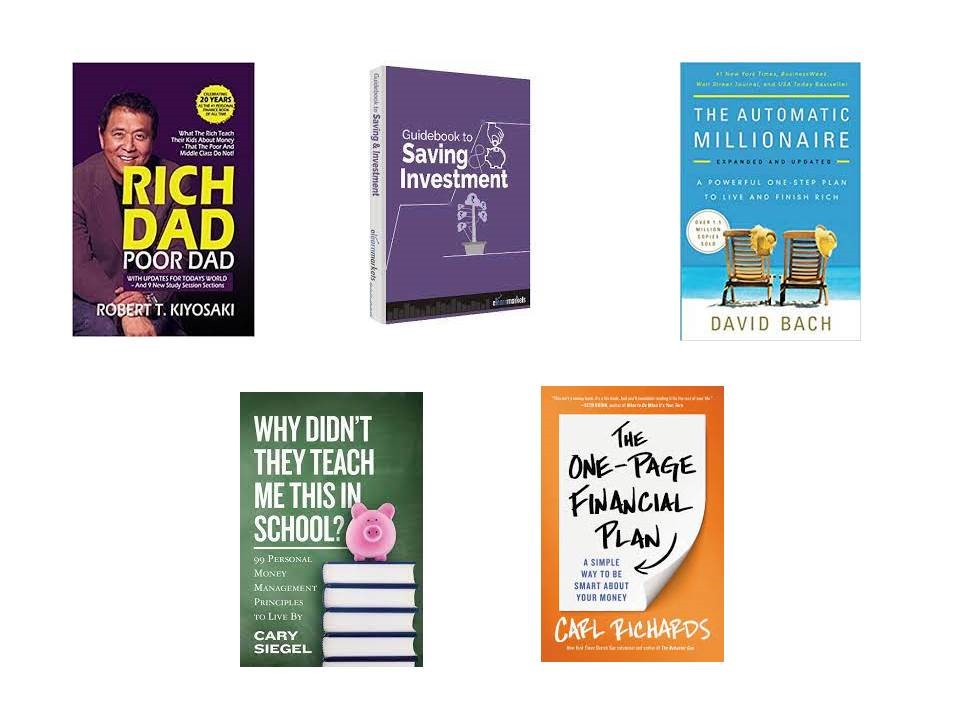
1. Rich Dad Poor Dad :
This classic book is a must read book for all investors. The author’s view is that the poor and middle class people work for a living whereas rich people work to learn.
In this book, Kiyosaki pressures on the importance of financial literacy. He states that financial independence is the ultimate goal.
The author focuses on those types of investments which produces periodic cash flows while also provides an increase in the value of equity for the investors.
According to him investments like real estates and stocks which give regular dividends are favourable. He also highlights the importance of tax planning.
2. Guidebook to Saving and Investing by Elearnmarkets :
This guidebook to saving and Investing by Elearnmarkets helps one to understand how to do their financial planning from the scratch, starting from how to make financial goals, how manage your debt to how to achieve them.
3. Why didn’t they teach me this in School?
The author of this book Siegel, who is a retired business executive has divided the book into 99 principles and eight money lessons which you should have learned by high school or college but didn’t.
This book was initially written for his five children when he realized they haven’t learn the important personal finance principles before they step into the real world, but eventually this book grew into a well-reviewed read.
This book contains money lessons, as well as firsthand experience and advice from Siegel. This easy-to-read book is ideal for college students or anyone who are looking to begin their personal finance journey.
3. The Automatic Millionaire :
David Bach’s “The Automatic Millionaire,” starts off with the story of a couple who is earning $55,000 combined annually, and how they achieved their financial dreams.
Their financial goals were from owning two homes, putting their children through college, and retiring at 55 with a $1 million.
Their secret behind achieving their financial goals was setting up a financial system that not only pays you first but one which is automatic. Other books written by Bach are “Smart Women Finish Rich,” “Smart Couples Finish Rich,” and “Start Late, Finish Rich.”
4. One Page Financial Plan:
This book written by Carl Richard will help you in identify your values and goals. The author’s simple steps will help you in learning how to prioritize what you really want in life and figuring out how to get there.
Creating a financial plan can seem difficult but the best plans aren’t long or complicated. A great plan does not involve with the details of how to save and invest your money and everything to do with why you’re doing it in the first place. After knowing what is important to you, you will be able to make better financial decisions in any market conditions.
5. The Total Money Makeover:
Debt management plays a crucial role when it comes to your personal finances.
In this book the author explains, in easy words, how to get out of debt and improve your financial picture through avoiding common pitfalls like rent-to-own, cash advances, or using credit.
This book also offers advice on how to start an emergency fund, saving for college and retirement.
Handpicked Courses for financial planning:
Below is the list of Financial Planning courses which you can do:
1. Personal Financial Planning:
When planning personal finances, the individual should consider the suitability of his or her needs for a range of banking products or investment private equity and also insurance. This course helps in training you for becoming financially independent.
This course will how you to plan for your future, financial planning for a newly married couple, plan for your child’s future and planning for your pension.
2. Certification In Online Wealth Management:
Certification in Online Wealth Management course is jointly certified by NSE Academy & Elearnmarkets.
This course helps in attaining the skills, knowledge, mindset and the morals necessary to perform ethically and responsibly in the highly regulated financial services industry
This course also helps you in responding to the challenges brought about by the altering nature of the Financial Services Sector.
3. Certification In Online Financial Planning & Wealth Management:
Certification in Online Financial Planning and Wealth Management course is jointly certified by NSE Academy and Elearnmarkets.
This course helps you in understanding your financial goals that will assist you in growing, managing and also protecting your wealth with its comprehensive course structure.
4. Come Let’s Invest – A Beginner’s Guide:
Let’s Invest, is an online course on investing for the beginners which is created for those who are seeking an introduction to the field of Personal Finance.
It is a finance course for those who want to start a career in Banks, Commercial and Retail Finance, Fund Management, Financial Instruments Trading and Sales, Investment Banking or Retail and Private Banking.
5. Personal Finance For Beginners:
The Personal Finance course helps you to become financially independent. With the help of this course you will learn how to pay off debt, build an emergency fund, save for retirement, increase your credit score, and save for personal goals (house, wedding, child’s college degree).
Handpicked Webinars for financial planning:
Here is a list of webinars for financial planning which you can watch that can help you in making better financial decisions:
1. Mistakes and Learnings from Investment Journey:
Every successful investor starts with the basics of financial planning, forms a financial plan, and is ready to stick to it. No matter how much or little money you have, the most important thing is to educate yourself about your opportunities.
With so much at stake in investing investors cannot afford to keep repeating actions that could have serious negative consequences for their financial goals.
In this webinar we will learn the mistakes and learnings while investing on behalf of clients or working with them while advising the clients.
2. “Beyond Financial Analysis” – Factors Which Impact the Best Investment Decisions:
Investment decisions are influenced by a multitude of factors. Financial analyses and fundamental analyses are the starting points. However, no one nevers talk in depth about all these things.
The main objective of this webinar is to understand the universe of investments.
3. Money Management – The Key to Successful Trading:
Most of the traders usually wipe out their capital in the first 3 to 9 months of their trading journey.
Money management helps in surviving in the market for a longer period of time, and helps your risk to stay controlled in losing trades.
Every trader who doesn’t know money management is at risk of blowing up full trading accounts at any time.
4. Capital Budgeting Decisions:
Capital budgeting is an important decision as it involves large pool of money, that affects firms profitability.
This main objective of this webinar is to discuss basics of Capital budgeting decisions and the methods of valuation like Net Present value (NPV), Internal Rate of Return(IRR), Payback period and Average Rate of Return (AROR).
Liked the content? Then you can also checkout our finance online certification courses to learn similar concepts in detail.
Happy Investing!
For more stock related queries visit web.stockedge.com


